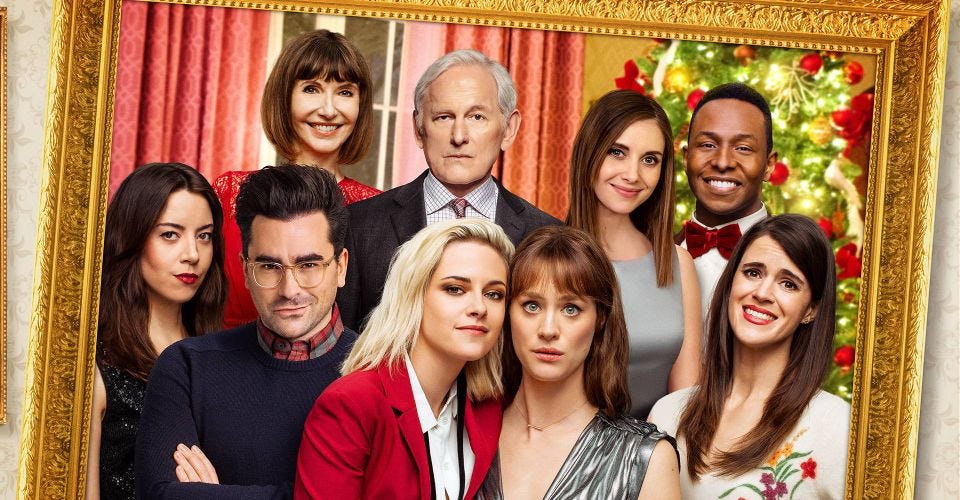‘happiest season’ didn’t have to be good to be perfect
The verdict on Hulu’s new queer Christmas movie is in: America's lesbians love Aubrey Plaza.
I can’t remember the last time a hotly anticipated movie’s streaming premiere date felt more perfectly timed: Last Wednesday, Hulu dropped Happiest Season, its brand new holiday rom com with a star-studded (by indie standards) cast and a clear mission: to queer the basic cable Christmas movie formula.
Premiering on the eve of what, for many, is a four-day weekend, Happiest Season offered something cozy via its festive aesthetics, as well as something off-kilter: Contrary to the endless stream of workaholic-girl-meets-wholesome-farmer-boy stories on Lifetime and Hallmark, this one featured a queer romance at its heart. In concept, it felt tailor-made for this moment in time when many people were not able to safely be with their families to celebrate Thanksgiving. Suddenly it was like everyone was appropriating estranged-queer-family-member culture by not heading home for the holiday.
The response to the movie on Gay Twitter, however, has been pretty resounding: Why was Abby (Kristen Stewart) putting up with the behavior of her girlfriend, Harper (Mackenzie Davis), and not trying to get with Harper’s ex, Riley (Aubrey Plaza) instead? Harper’s adherence to her conservative family’s norms has also drawn comparisons to Allison Williams’ character in Get Out and even prompted some people to call Happiest Season a horror movie.

As a self-certified horror gay, I feel semi-qualified to say that these takes are missing the point. While I’m impatiently awaiting the Scary Mary-like horror recut of the Happiest Season trailer, this movie was no horror film — even if Davis’ bangs do seem to reference Williams’ chaotic Froot Loops-eating energy.
Rather, the film, directed by queer icon Clea DuVall, was arguably successful at queering that tried-and-true, saccharine-sweet Hallmark formula. Those movies don’t run around the clock for months on end because they are good — they draw a huge audience back year after year because they are comforting, familiar and sometimes frustrating. Actually, yes, you’re supposed to be rolling your eyes. Yes, it’s not going to make total sense. Yes, it’s just as absurdly over-the-top as the holidays tend to be.
I think NPR’s Linda Holmes gets it right in her review that acknowledges some of the film’s clumsiness, and particularly the issues with the character of Harper. But still, Holmes notes, Happiest Season is “funny, it's charming, it's warm, and it's got a bunch of really good performances. It's so good to see queer creators and characters given their own space in this kind of popular genre entertainment.”
So, no, Happiest Season wasn’t good per se, but let’s just allow the queers to have a dumb, big-hearted, silly holiday romp. Let’s marvel in the overbearingness of Mary Steenburgen’s mom-with-an-iPad vibe. And can’t we all just agree to enjoy how Plaza’s presence in this movie practically jumps off the screen to twirl your hair around her finger?
All of that said, let’s not put all the pressure of queer holiday film representation on DuVall, Stewart and Dan Levy. If Happiest Season wasn’t doing it for you, there’s actually a whole lot of queerness still to be had in the holiday entertainment realm. Here are a few of my favorites, most of which I revisit every year:
Meet Me in St. Louis (1944): This one shouldn’t have to be explained. Judy Garland, ladies and gentletheys.
Female Trouble (1974): If Divine as Dawn Davenport screaming about cha cha heels and physically brawling with her parents doesn’t get you in the holiday spirit, I don’t know what will.
Black Christmas (1974): This is actually a horror movie and I’m not sure I’ve ever seen a character have stronger bisexual energy than Margot Kidder did as a brassy sorority girl named Barb here (fast forward to 0:50).
Mame (1974): The movie is based on a novel and play written by Patrick Dennis, a gay man, and is about an eccentric woman whose young nephew comes to live with her after the death of her brother. Played here by Lucille Ball, the role has also gone to names like Angela Lansbury and Rosalind Russell.
Christmas at Pee-wee’s Playhouse (1988): I mean, just look at this cast. You’ve got Grace Jones, k.d. Lang, Cher, Little Richard, Charo, Oprah, Whoopi Goldberg and Zsa Zsa Gabor. It’s perfect, and it’s typically streaming on Netflix.
Home for the Holidays (1995): Jodie Foster directs and Robert Downey Jr. plays an estranged gay son in this effective and poignant dramedy. Bonus points, as always, for Holly Hunter’s presence.
The Family Stone (2005): This is an obvious choice here, but this movie is fantastic and we, as a society, don’t give Rachel McAdams specifically enough credit for her performance here.
Carol (2015): It’s hard to believe this movie came out five years ago, but let’s just all take a deep breath and live in the scene where Carol (Cate Blanchett, with those brilliantly red nails) meets Therese (Kate Mara) in a department store circa the 1960s once again. Oh, the gentle thrill.
Dash & Lily (2020): OK, this one is just all around heart-warming fun and is actually a series instead of a movie, but there is a strong queer subplot and the Strand bookstore and other NYC locations are prominently featured if you happen to miss New York.
***
Read: If you haven’t noticed yet, let me just point out that Dionne Warwick is on Twitter and is preternaturally great at being on Twitter.


On the flip side, if you’d like an example of a celebrity whose grip on effective social media usage is loosening, here is Tara Reid attempting to recruit Nicole Kidman to join a “five-movie franchise” she is starring in and producing via an Instagram comment. The film is called Masha’s Mushrooms and I cannot look away.
Watch: If you’re not already watching and enjoy the energy of shows like Great British Bake-Off, you need to get your hands on an HBO Max log-in immediately so that you can watch Full Bloom, a flower arranging competition. The show is beautifully shot, entails some incredibly daunting challenges and features Chicago’s own Elizabeth Cronin of Asrai Garden — probably my favorite florist of all time, and one of my goth fashion heroes — as one of the judges. As a bonus, you can watch the dog-grooming competition Haute Dog on the same platform immediately afterward.
Listen: Finally, a queer holiday bonus. This week’s song of the week comes from The Best Little Whorehouse in Texas via Dolly Parton, who has an incredibly horny (yeah, I know) new album of Christmas music out.








